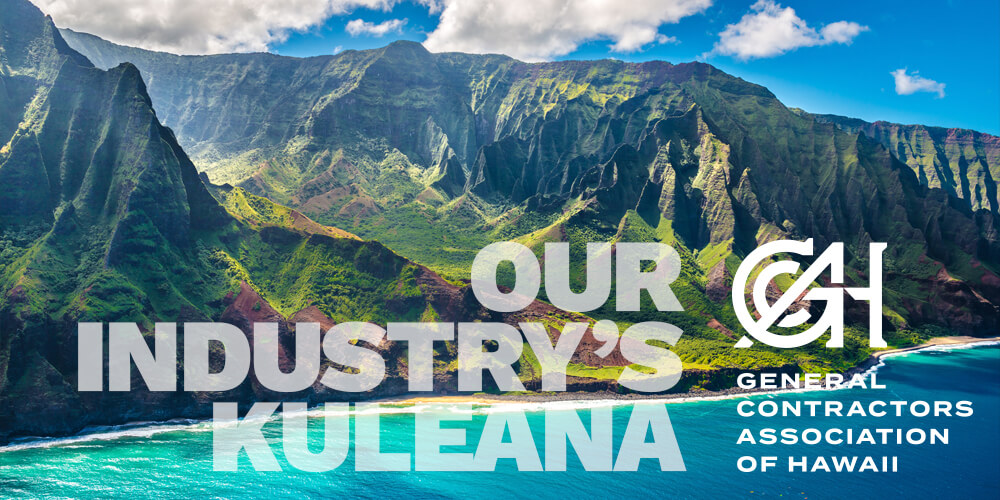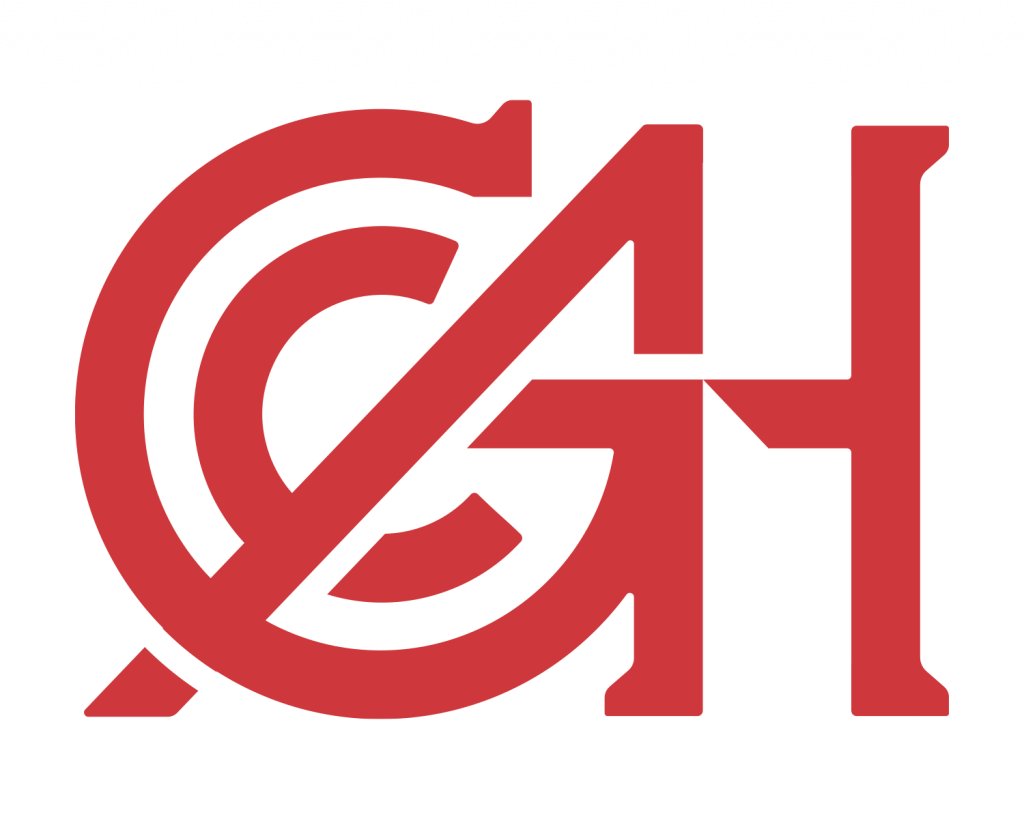
Our Industry’s Kuleana – The Environment
Preserving Hawaii’s natural beauty and fragile ecosystem are top priorities for the GCA. Building responsibly and protecting the environment are not mutually exclusive. In fact, general contractors are weaving more environmentally-friendly practices into their construction projects. The GCA Environment Committee, chaired by Gordon Scruton, superintendent of Nordic PCL Construction, shares the important work of his committee and new, emerging trends.
Ensuring general contractors build projects in compliance with all applicable environmental laws requires ongoing vigilance. The GCA Environment Committee serves as the go-to organization for members to keep up-to-date on regulations that impact construction, including permitting and enforcement changes, to avoid financial penalties for violations and project delays.
“There has been a stronger emphasis on developing and maintaining storm water pollution and prevention plans. Projects develop site specific plans to prevent storm water and any pollutants from escaping the jobsite and entering the environment.”
The committee provides timely updates from two key government agencies: the City and County of Honolulu’s Department of Environmental Services and the Hawaii State Department of Health.
Gordon says requirements are constantly changing.
“There has been a stronger emphasis on developing and maintaining storm water pollution and prevention plans, he said. “Projects develop site specific plans to prevent storm water and any pollutants from escaping the jobsite and entering the environment.”
Gordon has seen numerous changes over the years.
“One of the biggest changes has been to focus more attention on recycling waste generated by the project,” he said. “Everything from concrete, rock, cardboard and miscellaneous metals are separated and sent for recycling.”
Gordon noted that more projects are following LEED guidelines, even if they are not seeking LEED accreditation. The U.S. Green Building Council established the LEED guidelines to save money, improve efficiency, lower carbon emissions and create healthier places for people. They also address climate change and meet environment, safety and environmental, social and governance (ESG) goals, enhance resilience, and support more equitable communities. (more on LEED here)

Many federal, state and county laws and regulations shape the construction practices, but there are many general contractors who are going above and beyond to do their part to protect Hawaii’s beauty. Many recognize it is their kuleana (responsibility) and environmental stewardship is part of their company’s culture. GCA asked our members to share about their company’s commitment to the environment. Mahalo to all the members who contributed!
Q: In Hawaii, we are much more aware of the need to preserve and protect our environment. What is your company’s perspective on mālama ‘āina or protecting the land?
Jill Uyeda (Hawaiian Dredging Construction Company):
Hawaii is our home and building a better Hawaii conscientiously and safely is our livelihood and legacy. At Hawaiian Dredging Construction, we accomplish this by adhering to our core values: Safety, Diversity, Community, and Sustainability. Hawaii is deeply intertwined with its traditions, people, practices, and resources – all of which can be significantly impacted by construction. By being mindful of how we interface with the land and its people, we keep it safe from unnecessary harm.
We train our teams to be competent in their environmental responsibilities. We empower them to confidently affect positive change throughout the life cycles of projects and operations. Diligent planning enables us to optimize production without it competing with our role as environmental protectors.
George Denise (Swinerton Builders):
We believe that it is an integral part of being an organization in Hawaii, that we must care for the people and place where we live and work.
Samantha Haas (WestPac Wealth Partners):
Our community and environment are the lifeblood of our business. We continue to spread the importance of this as we grow from our Hawaii roots across the country.
Paul Kelekoma Kāne III, CSI, CDT (Build Pono, LLC):
The focus of "Build Pono" is to "build different, to build better, to build pono" by focusing on specialty construction materials that have been proven in other parts of the world that could be manufactured here in Hawaii. Importing containers of components to make what would equal hundreds of containers of finished products sends less construction waste to landfills or to be shipped out. Another focus is products that have huge shipping advantages like composite rebar vs. steel rebar. A typical full truck/rack load of steel rebar is 44,000 pounds or 22 tons. The same linear footage of composite rebar can equal to 150 tons on just one truckload, so shipping costs are much less and provides much more. In addition, composite rebar cannot corrode and cost less than steel and is ICC approved for structural applications.
Landon Loitz (Kirschner Contractors):
At Kirschner Contractors, we are firm believers that proper planning, scheduling, and construction management over the life cycle of a project can reduce the environmental impacts of the construction industry and go a long way to malama aina. The proper planning of resources (machinery, shipping trucks, tower cranes) combined with an accurate CPM Schedule can reduce the amount of idle time resources sit or are moved due to bad planning. Furthermore, through proper scheduling techniques, expensive and environmentally impactful delivery methods, such as airfreight, can be avoided. We believe that by properly planning and scheduling projects, the environmental impact can be reduced significantly due to increased efficiency among the participants. From the transportation of materials to the site to the efficient use of resources among participants, proper scheduling increases efficiency and reduces re-work, which translates into fewer greenhouse emissions produced by our projects. We also wear reef-safe sunscreen as well as participate in beach cleans up! Cheehoo!
Q: Besides compliance with stringent environmental laws, is there anything that your company does to go above and beyond to protect the environment?
Jill Uyeda (Hawaiian Dredging Construction Company):
At Hawaiian Dredging, environmental issues are as important and visible as safety through our Health, Safety, & Environmental (HSE) Program. The spectrum of our work – spanning from vertical building construction and renovations to waterfront and civil infrastructure – means our expertise and scope of environmental oversight must be equally diverse.
Beyond the scope of our HSE Program, many of Hawaiian Dredging’s employees serve as active members on various committees of GCA Hawaii, are active in the community, and partner with local governmental agencies such as DOT and DOH to better understand the regulatory landscape. In addition to our compliance programs, we utilize sustainable practices on our projects with LEED and other green building programs.
George Denise (Swinerton Builders):
As part of our company’s corporate responsibility philosophy, Swinerton supports and encourages all efforts to reduce the environmental impact of our projects. While much of what we do is heavily driven by our clients, we do attempt to guide our clients toward more sustainable solutions for their projects. We work alongside owners and design teams throughout the course of a project to identify opportunities and strategies for reducing the embodied carbon of a project with sustainable material choices like mass timber.
As a local organization, we engage and encourage our employees to engage in many volunteer and outside activities to care for the community around us such as beach clean-up days, lo'i clean-up days, and more.
Samantha Haas (WestPac Wealth Partners):
We participate in company and team-led community service projects like beach cleanups. We were a leader in our industry when it came to being 100% paperless.
Paul Kelekoma Kāne III, CSI, CDT (Build Pono, LLC):
Business is virtual and remote and can be run from anywhere in the world but is based and registered here in Hawaii as a DBE/SBE supplier of special construction materials. No office, no paper or at least minimal. At Build Pono we are always learning and teaching what I learn regarding the environment and incorporating new and innovative materials to support the environment.
Landon Loitz (Kirschner Contractors):
We have embraced the paperless route and utilize tablets for note-taking. As a prolific note taker, I estimate I personally save 23 trees by using my tablet instead of composition books.
We hope you enjoyed this featured article! Comments or feedback? Send an email to communications@gcahawaii.org.
Mahalo!
